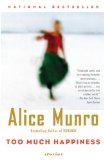Summary | Excerpt | Reading Guide | Reviews | Beyond the Book | Readalikes | Genres & Themes | Author Bio

Stories
by Alice MunroTerribly sincere, and at the same time very sly.
And at the end she wrote, “A real Russian, he is, into the bargain.”
Fat Maksim, she called him then.
“I have never been so tempted to write romances, as when with Fat Maksim.”
And “He takes up too much room, on the divan and in one’s mind. It is simply impossible for me, in his presence, to think of anything but him.”
This was at the very time when she should have been working day and night, preparing her submission for the Bordin Prize. “I am neglecting not only my Functions but my Elliptic Integrals and my Rigid Body,” she joked to her fellow mathematician, Mittag-Leffler, who persuaded Maksim that it was time to go and deliver lectures in Uppsala for a while. She tore herself from thoughts of him, from daydreams, back to the movement of rigid bodies and the solution of the so-called mermaid problem by the use of theta functions with two independent variables. She worked desperately but happily, because he was still in the back of her mind. When he returned she was worn out but triumphant. Two triumphs—her paper ready for its last polishing and anonymous submission; her lover growling but cheerful, eagerly returned from his banishment and giving every indication, as she thought, that he intended to make her the woman of his life.
The Bordin Prize was what spoiled them. So Sophia believed. She herself was taken in by it at first, dazzled by all the chandeliers and champagne. The compliments quite dizzying, the marvelling and the hand kissing spread thick on top of certain inconvenient but immutable facts. The fact that they would never grant her a job worthy of her gift, that she would be lucky indeed to find herself teaching in a provincial girls’ high school. While she was basking Maksim decamped. Never a word about the real reason, of course—just the papers he had to write, his need for the peace and quiet of Beaulieu.
He had felt himself ignored. A man who was not used to being ignored, who had probably never been in any salon, at any reception, since he was a grown man, where that had been the case. And it wasn’t so much the case in Paris either. It wasn’t that he was invisible there, in Sonya’s limelight, as that he was the usual. A man of solid worth and negotiable reputation, with a certain bulk of frame and intellect, together with a lightness of wit, an adroit masculine charm. While she was an utter novelty, a delightful freak, the woman of mathematical gifts and female timidity, quite charming, yet with a mind most unconventionally furnished, under her curls.
He wrote his cold and sulky apologies from Beaulieu, refusing her offer to visit once her flurry was over. He had a lady staying with him, he said, whom he could not possibly present to her. This lady was in distress and needed his attention at the moment. Sonya should make her way back to Sweden, he said; she should be happy where her friends were waiting for her. Her students would have need of her and so would her little daughter. (A jab there, a suggestion familiar to her, of faulty motherhood?)
And at the end of his letter one terrible sentence.
“If I loved you I would have written differently.”
The end of everything. Back from Paris with her prize and her freaky glittery fame, back to her friends who suddenly meant no more than a snap of her fingers to her. Back to the students who meant something more, but only when she stood before them transformed into her mathematical self, which was oddly still accessible. And back to her supposedly neglected but devastatingly merry little Fufu.
Everything in Stockholm reminded her.
She sat in the same room, with the furniture brought at such foolish expense across the Baltic Sea. The same divan in front of her that had recently, gallantly, supported his bulk. And hers in addition when he skillfully gathered her into his arms. In spite of his size he was never clumsy in lovemaking.
Excerpted from the title story of Too Much Happiness by Alice Munro Copyright © 2009 by Alice Munro. Excerpted by permission of Knopf, a division of Random House, Inc. All rights reserved. No part of this excerpt may be reproduced or reprinted without permission in writing from the publisher.
Heaven has no rage like love to hatred turned, Nor hell a fury like a woman scorned.
Click Here to find out who said this, as well as discovering other famous literary quotes!
Your guide toexceptional books
BookBrowse seeks out and recommends the best in contemporary fiction and nonfiction—books that not only engage and entertain but also deepen our understanding of ourselves and the world around us.